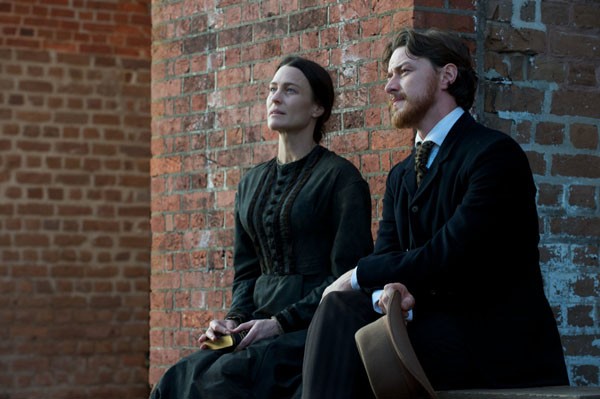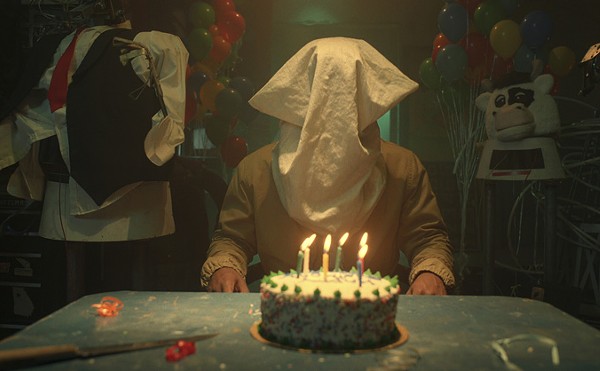The Conspirator
3 Stars
(PG-13)
This we know: Mary Surratt is doomed. The owner of the Washington boarding house where John Wilkes Booth and his co-conspirators stayed, Surratt was swept up in the dragnet after the attempted assassinations of Vice President Andrew Johnson, Secretary of State William Seward and, of course, the successful attempt on President Lincoln. In the months after Lincoln’s murder and Booth’s death at the hands of federal troops, the government seeks justice – or perhaps, plain vengeance – and Surratt and seven remaining conspirators stand to hang.
The story of Surratt’s imprisonment, trial at the hands of a military tribunal and inevitable hanging – the first time the U.S. government executed a woman – The Conspirator is a solid if sometimes too-airtight courtroom drama. Robert Redford’s often bloodless, slow-grind direction actually works for him here. His formal, old-fashioned hand lends permanence to the affair. The movie is also the first one produced by the American Film Company, whose mission is to make movies true (or truer) to history than most historic melodramas. This attention to historic detail, however, both enriches the visual experience and ensnares the script.
Frederick Aiken (John McAvoy), a Union veteran fresh from law school, is asked to defend Surratt, an impoverished widow of a Maryland plantation owner and proud Southerner. Sen. Reverdy Johnson (Tom Wilkinson) foresees a predetermined outcome for the military tribunal set to try her and the co-conspirators, and hands it off to the junior lawyer. “Experience means nothing,” Johnson says, “when they make up the rules as they go along.”
Aiken begrudgingly takes the job and in the glare of a military tribunal – a kangaroo court, really – he is transformed from glib attorney to passionate defender of Surratt’s rights, and champion of Constitutional values. The movie might as well have been called The Defender, as Robin Wright’s Surratt has little more to do than stoically await her fate. She prays in her Fort McNair jail cell, wastes away and refuses to give up her son, who might exonerate her. When Aiken puts her daughter on the stand, Surratt’s wails and protests are hidden; soldiers have blocked the woman (and us) from seeing her daughter. Surratt is a cipher; we never know her true guilt or innocence.
Despite Aiken’s best efforts, there is no way out. When he stands up to the prosecution, he loses his feckless girlfriend (Evan Rachel Wood) and his membership to a private club. The clamor for retribution against the South infuses everything.
Secretary of War Edwin Stanton (a perfectly vindictive and scheming Kevin Kline) and Joseph Holt, the Judge Advocate General in Stanton’s War Department (Danny Huston), deflect Aiken’s efforts at every turn with treachery, lies and the made-up rules Sen. Johnson predicted, all under the guise of healing the nation’s wounds. It’s an exhausting affair. We’re told at the end that the Supreme Court eventually ruled that citizens would always get trials by juries, even in a time of war. But that’s too late for Surratt, who is hung on the movie’s only sunny day, in a scene that recollects innumerable gallows scenes in its pacing and tone.
The Conspirator flows from Civil War battlefield to frenetic assassination night, to tensely detailed courtroom drama to gallows. The behind-the-scenes research is obvious, and likely will blow many history buffs’ neurons out of excitement, so complete is the 1860s experience.
But for all its strengths – its performances, its historical detail, with Savannah a convincing stand-in for Washington – The Conspirator feels trapped in the rarefied air of period correctness. The adherence to detail that animates the production can also mislead: The Conspirator is not exactly historical record but educated guesses and dramatizations drawn from the record.
Unlike so many historical melodramas that mythologize its subjects and play fast and loose with the facts, The Conspirator goes about its distortions honestly.
The movie invariably parallels our own age: Fort McNair on the Anacostia no longer imprisons enemies of state; we have that compound on Cuba’s coast. The Constitution can be bent in our time, as it was then.
















